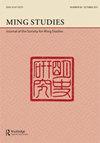Measuring Reliability In The Wartime Transport of Provisions: The Case of Mao Yuanyi (1594–1641)
IF 1.1
0 ASIAN STUDIES
引用次数: 1
Abstract
A military strategist and advisor, Mao Yuanyi (1594–1641) was one of the most prolific writers of the late Ming period on military matters and participated in the Ming war against the Jurchen in Liaodong in the early seventeenth century. In his seminal study on the conduct of war, the Records of Military Preparedness (Wubeizhi), he exhaustively discussed the costs and benefits of the transport methods available at the time, including carts, pack animals, and water transport. Among all the transport methods that he considered, Mao clearly favored what he called “human transport” (renyun), which exclusively relied on the labor of human bearers. By drawing on Mao’s writings on the transport of provisions, this study analyzes his forceful argument in favor of employing human labor and illuminates the practices of organizing wartime logistics. It also sheds light on the manner in which the costs and benefits of transport methods were being evaluated and how the notions of efficiency and reliability came into play in calculations concerning transport in the late Ming period.战时物资运输中的可靠性度量——以毛元义(1594-1641)为例
毛元彝(1594–1641)是一位军事战略家和军事顾问,是明末军事方面最多产的作家之一,并参与了17世纪初明朝在辽东对女真的战争。在他关于战争行为的开创性研究《武备志》中,他详尽地讨论了当时可用的运输方式的成本和收益,包括推车、驮畜和水运。在他所考虑的所有运输方法中,毛显然更喜欢他所说的“人力运输”(人运),这种运输完全依靠人力运输。本研究借鉴毛关于物资运输的著作,分析了他支持使用人力的有力论点,并阐明了战时后勤组织的实践。它还揭示了运输方法的成本和效益的评估方式,以及效率和可靠性的概念是如何在晚明时期的运输计算中发挥作用的。
本文章由计算机程序翻译,如有差异,请以英文原文为准。
求助全文
约1分钟内获得全文
求助全文

 求助内容:
求助内容: 应助结果提醒方式:
应助结果提醒方式:


